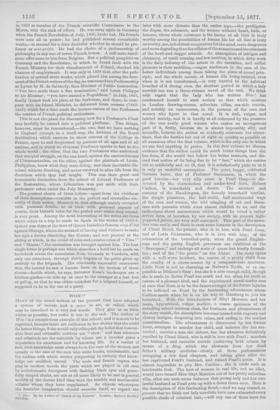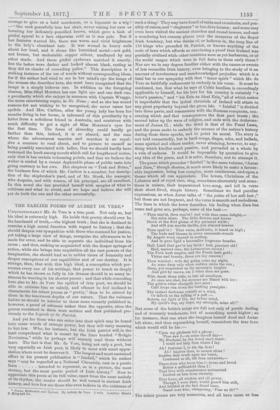WON !*
MANY of the novel-writers of the present time have adopted a system of morals and a genre in art, so called, which may be described in a very few words. They give us as little virtue as possible, but make it win in the end. The author of Won is a conspicuous example of this school, and it is more to be regretted, because there are evidences in her stories that she could do better things, if she would only relinquish the belief that honour- able lives and estimable motives are "slow," and that schemers and criminals are the materials by whose use a novelist gains a reputation for smartness and for knowing life. As a matter of fact, such knowledge must always be in the case of the women, and usually in the case of the men who write books, unattainable, and the realism with which stories purporting to embody that know- ledge are credited, unreal. The male and female rogues who play in modern novels the parts which are played in old ones by melodramatic foreigners with flashing black eyes and grace- fully draped cloaks, are not at all more likely to be met in general society of the decent kind than were the terrible and sentimental villains whom they have supplanted. As objects whereupon the feminine imagination should exercise itself, we regard the
w
Won! By the Author of "Jennie of the Prinae." London : Richard Bantle aud Son. later with more distaste than the earlier type,—the profligates, the dupes, the schemers, and the women without heart, faith, or honour, whose whole existence is the barter of all that is truly worthy among the possibilities of human life for all that is truly unworthy, are, as habitual companions for the mind, more dangerous and more degrading than the villains of the romantic and the criminals of the bowl-and-dagger schools. An atmosphere of intrigue and chicanery, of small cunning and low motives, in which dirty work is the daily industry of the actors in the narrative, and selfish pleasure is their ambition,—vague sentiment in the case of the better individuals among them taking the place of sound prin- ciple, and the whole morale of human life being twisted, even when it is not transformed,—is very hurtful to the habitual breather of it during even the shortest period in which a lady novelist can run a three-volume novel off the reel. We think with regret that the lady who has written Won I has condemned herself to such society as that which musters in London drawing-rooms, suburban villas, sea-side resorts, and notably on racecourses, in the persons of the men and women who figure in that novel. It is dull, vulgar, and tainted society, and it is hardly at all redeemed by the presence of the one really good woman who makes an incongruous part of it, firstly, because she is almost impossibly silly, and secondly, because the author so evidently mistrusts her attrac- tions, that she hustles her out of sight as quickly as possible on all occasions after the first volume, which is the only one in which we can find anything to praise. In this first volume we discern evidence that the author could do much better things than she has done, if she would but follow her better instincts, and dis- card that notion of its being fine to be "fast," which she carries out so artificially and so ill, that it is satisfactorily plain to us it is only an unskilful assumption. The quiet, happy, cultivated German home, that of Professor Steinmann, in which the good heroine—her very silly name is Pearl Gray—is dis- covered by the characterless and under-bred hero, Hubert Carlton, is remarkably well drawn. The manners and customs of the Hamburgers, the homely household routine, the simple pleasures, the half-stolid, half-sentimental ways of the men and women, the odd mingling of art and litera- ture with pursuits which seem almost childish to us, and the enthusiasm about amusements which would be voted a rather severe form of boredom by our society, with its present high- peppered palate, arc very well conveyed. This part of the narra- tive runs easily, and there is oven some humour in the description of Claud Morel, the painter, who is in love with Pearl Gray, and of Lotto, Steinmann, who is in love with him ; of the solemnities of the betrothal-party, when the grand English- man and the pretty English governess are exhibited as the " Brautpaar," and undergo all sorts of queer but kindly formali- ties; and of the "ice picnic" on the Aister. The story opens with a well-worn incident, the rescue of a pretty child from the cruelty of a circus-master by a compassionate spectator. Little Dora is not so charming as Bulwer's Nydia, or so im- possible as Dickens's Sissy ; but she is a nice enough child, though she is made to flatter Pearl too much and too often for truth to nature of a pleasant kind, and the experienced novel-reader sees at once that Dora is to be the future avenger of the future injuries to be inflicted on Pearl by the fascinating adventuress whom Carlton meets when he is on Ids way to Hamburg to join his betrothed. With the introduction of Sibyl Moreton and her mean, hypocritical, vulgar mother, a coarse specimen of the swindling school-mistress class, the freshness and pleasantness of the story vanish, the atmosphere becomes tainted with roguery and clumsy intrigue, deepening into crime, and ending in the crudest sensationalism. The adventuress is discovered by her former lover, attempts to murder her child, and believes she has suc- ceeded; marries a man she abhors, has her advances definitively repelled by Gland Morel, who is still in love with Pearl ; murders her husband, and commits suicide (achieving both crimes by means of a drug which she abstracts from her dead father's military medicine - chest), all these performances occupying a few final chapters, and taking place after she has captivated Pearl's husband, and ruined Pearl's peace. Ibis almost impossible to pity Mrs. Caribou; she is made such an intolerable fool. The best of women in real life, not an idiot, would have turned Miss Sibyl Moreton out of her pretty suburban villa, after one such scene between that young lady and her own lawful husband as Pearl puts up with a dozen times over. Here is the description of this fascinating fiend,—and we may remark en passwit that we think our lady novelists have now exhausted every possible shade of criminal hair,—will any one of them have the courage to give us a bald murderess, or a bigamist in a wig? —" She sank peacefully into her chair, never raising her eyes or lowering her delicately-pencilled brows, which gave a look of pitiful appeal to a face otherwise cold as it was pale. But if her features wanted life, there was warm and vivid brightness in the lady's abundant hair. It was wound in heavy coils about her head, and it shone like burnished metal—not gold, not bronze, but undeniable copper colour, unalloyed by any other shade. And those pitiful eyebrows matched it exactly, but the lashes were darker and looked almost black, resting as they did on cheeks of exceeding pallor." This description is a striking instance of the use of words without corresponding ideas, for if the author had tried to see in her mind's eye the image of the woman she describes here, she must have recognised that the image is a simply hideous one. In addition to the foregoing charms, Miss Sibyl Moreton has one light eye and one dark one, a peculiarity which she enjoys in common with Captain Wragge, the more entertaining rogue, in No Name; and as she has sound reasons for not wishing to be recognised, she never raises her eyelids. And Mrs. Carlton, after the young lady has been for months living in her house, is informed of this peculiarity by a letter from a solicitous friend in Australia, and contrives with much difficulty to get a sight of Miss Moreton's eyes for the first time. The force of absurdity could hardly go farther than this, indeed, it is so absurd, and the man whom the adventuress marries and murders is so repul- sive a creature to read about, and to picture to oneself as being possibly associated with ladies, that we should hardly have reckoned the book among novels which call for lengthened notice, only that it has certain redeeming points, and that we believe the writer is misled by a recent deplorable phase of public taste into going contrary to her own. Her chapters on "Teak and Brine," the business firm of which Mr. Carlton is a member, her descrip- tion of the shipbroker's yard, and of Mr. Stock, the manager, who despairs, and with reason, of his principal, are all excellent. In this novel she has provided herself with samples of what to cultivate and what to avoid, and we hope and believe she will yet do both the one and the other successfully.































 Previous page
Previous page